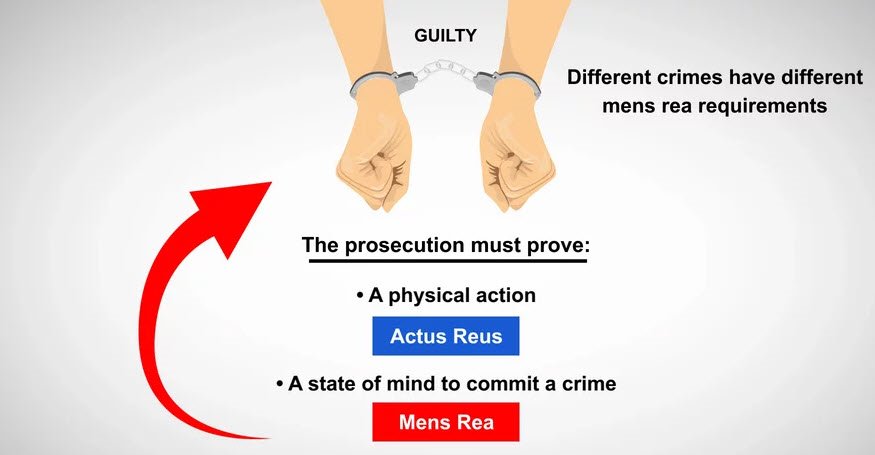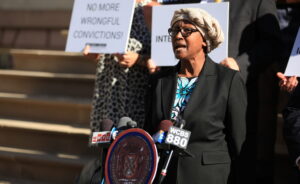
The U.S – Mens rea, or “guilty mind” in Latin, is a state of mind requirement for many laws. This requires an inquiry into the perpetrator’s mind to determine whether they had the mental state required to commit a crime. For example, if a criminal statute requires that a defendant understand the consequences of their action and they were incapable of understanding due to lack of information or a cognitive disability, they would not be capable of committing the crime. At certain stages of intoxication, the human brain is incapable of certain states of mind.
This presents an interesting question: at what point is an individual simply too hammered to commit crimes with particular mens rea requirements, i.e., murder?
Elements of a Crime
In general, for a perpetrator to be guilty of a crime, they must satisfy four elements:
- Actus reus, or the criminal act or conduct, including failing to act, which typically must be committed voluntarily (i.e., not a reflex or other involuntary action);
- Mens rea, or mental state.
- Concurrence of the mens rea and criminal act, that is, that the mens rea was present before or during the commission of the crime; and
- Causation, or causal link between the act committed and the harm
However, this is a general rule: many crimes do not require all of these elements, such as “strict liability” crimes which only require that the criminal act was done regardless of the mental state. This can include crimes such as certain possession of controlled substance charges or statutory rape.
Types of Mens Rea
Mens rea is a necessary element for many crimes. For example, the subcategory of crimes of “specific intent,” as implied by the name, requires that the actor had specifically intended to commit the harm described in the statute.
There are several different mental states that can be required to satisfy a mens rea requirement of a crime. As per New York Consolidated Laws, Penal Law – PEN § 15.05 Culpability, the definitions of these culpable mental states include:
- Intentionally: A person acts intentionally with respect to a result or to conduct described by a statute defining an offense when his conscious objective is to cause such result or to engage in such conduct;
- Knowingly: A person acts knowingly with respect to conduct or to a circumstance described by a statute defining an offense when he is aware that his conduct is of such nature or that such circumstance exists.
- Recklessly: A person acts recklessly with respect to a result or to a circumstance described by a statute defining an offense when he is aware of and consciously disregards a substantial and unjustifiable risk that such result will occur or that such circumstance exists. The risk must be of such nature and degree that disregard thereof constitutes a gross deviation from the standard of conduct that a reasonable person would observe in the situation. A person who creates such a risk but is unaware thereof solely by reason of voluntary intoxication also acts recklessly with respect thereto; and
- Criminal negligence: A person acts with criminal negligence with respect to a result or to a circumstance described by a statute defining an offense when he fails to perceive a substantial and unjustifiable risk that such result will occur or that such circumstance exists. The risk must be of such nature and degree that the failure to perceive it constitutes a gross deviation from the standard of care that a reasonable person would observe in the situation.
Note that, in New York, the definition of “reckless” explicitly excludes “voluntary intoxication,” but would implicitly allow for an involuntary intoxication defense. Involuntary intoxication could reduce the mens rea from “reckless” to “criminally negligent,” depending on the circumstances.
Effects of Intoxication on Decision-Making
The effects of intoxication on decision-making are well-documented throughout human history: History’s greatest drunk, Alexander the Great, lost 42 soldiers to alcohol poisoning after a drinking contest and burned the Persian palace to the ground on a drunken whim, while Boris Yeltsin was once found stumbling in his underwear on the White House lawn trying to hail a cab.
Science has caught up with commonplace observations: intoxication leads to bad decisions. Looking at alcohol, this is because alcohol is a depressant that impacts inhibitions and diminishes levels of norepinephrine. Norepinephrine helps prepare the brain to take action and improves attentiveness, typically enhancing decision-making skills. Cocaine similarly causes chemical imbalances in the brain, leading to more impulsive decision-making that involves more risk-taking, and a wide variety of other illegal substances can decrease decision-making abilities.
While illegal drugs and alcohol are obvious culprits, prescription medications can also affect decision-making skills. This was on prominent display when patients taking Ambien reported that they were acting unconsciously, with symptoms allegedly ranging from sleep-driving to offensive tweets posted by Roseann Barr. The irrational behavior exhibited when many use Ambien during flights has led flight attendants to refer to them as “Ambien zombies.”
Lesser Included Offenses
When a crime is charged, it will typically be the most serious version of that crime that can be charged under the circumstances. When this happens, there are often lesser charges that are necessarily committed during the course of a greater crime that has fewer or lesser elements to prove.
For example, if a suspect was arrested for knowingly and unlawfully possessing 8 ounces or more of a narcotic drug, they could be charged with Criminal Possession of a controlled substance in the first degree. If they were found guilty, they would have been guilty of criminal possession of a controlled substance in the second degree, which only requires 4 ounces or more of a narcotic drug. If they were charged with criminal possession of a controlled substance in the first degree, but the prosecution could only prove that they had 7 ounces of the narcotic substance at trial, they would not be guilty of the first-degree charge. However, as the second-degree crime is encompassed by the first-degree crime but only requires 4 ounces, they could be found guilty of the second-degree charge without being separately charged with it.
Essentially, if a charge that has several tiers fails at the top tier (first degree), it will automatically default to the next highest tier (second degree), which will then default to the next highest tier (third-degree) should the second-degree fail, until either they are found guilty of a lesser included charge, or no tiers are left. Should a prosecutor run out of tiers to charge, they would be found not guilty of the offense.
Effects of Intoxication on Mens Rea
Mens rea defenses rely on the negation of the requisite mens rea. This can be due to factors affecting a perpetrator’s mental state, such as insanity, extreme emotional disturbance, or intoxication. Which defense can be used will depend on the defendant and mens rea required for the crime.
Bear in mind that intoxication by itself is not a defense, but it can be part of a partial defense, and whether the intoxication was voluntary will be considered. The quintessential example of mens rea being tested is a spouse walking in on infidelity. Let’s examine a few potential scenarios:
- A spouse discovers infidelity through a rumor, and over several hours tracks down, shoots, and kills the spouse and their partner;
- A spouse walks in on infidelity, is deeply disturbed, and immediately shoots and kills their spouse and their partner on the spot;
- A spouse, after drinking heavily and using drugs that impair impulse control and decision-making, walks in on infidelity, is deeply disturbed, and immediately shoots and kills the spouse and their partner on the spot; and
- A spouse has severe brain damage and PTSD from a tour in Iraq that limit their ability to control their impulses from an Army tour in Iraq. Their doctor negligently took them off their psychiatric meds after they seemingly caused a violent outburst, leaving them more vulnerable to emotional overstimulation. On the way home, they accepted a drink that was not properly labeled, and they could not know contained cannabis. Intoxicated, they walk in on the infidelity, are deeply disturbed, and shoot the spouse and their partner.
In each of these scenarios, there are different arguments regarding mens rea. While they all involve a spouse reacting to infidelity by killing both parties, they are ordered by strength of mens rea defenses:
- Scenario 1 includes little for mens rea defenses: the perpetrator was less emotionally disturbed as they did not walk into infidelity to learn about it, and then had at least some time to cool off before deliberately taking action;
- Scenario 2 includes an argument for extreme emotional disturbance due to the manner in which they discovered the infidelity, and the immediate action did not allow for a cooling-off period;
- Scenario 3 adds intoxication as a factor for their extreme emotional disturbance. This intoxication was, however, voluntary, and so will be given less weight; and
- Scenario 4 includes extreme emotional disturbance exacerbated by mental health issues despite the perpetrator seeking help, partially caused by a negligent psychiatrist. They were also intoxicated in a manner that inhibited their decision-making, and the intoxication was not voluntary.
Looking to the statutes defining murder, the most serious crime the perpetrator could be charged with is murder in the second degree, which reads that a person is guilty of murder in the second degree when:
“1. With intent to cause the death of another person, he causes the death of such person or of a third person; except that in any prosecution under this subdivision, it is an affirmative defense that: (a) The defendant acted under the influence of extreme emotional disturbance for which there was a reasonable explanation or excuse, the reasonableness of which is to be determined from the viewpoint of a person in the defendant’s situation under the circumstances as the defendant believed them to be. Nothing contained in this paragraph shall constitute a defense to a prosecution for, or preclude a conviction of, manslaughter in the first degree or any other crime…
2. Under circumstances evincing a depraved indifference to human life, he recklessly engages in conduct which creates a grave risk of death to another person, and thereby causes the death of another person;”
A perpetrator is guilty of manslaughter in the first degree when:
“1. With intent to cause serious physical injury to another person, he causes the death of such person or of a third person; or
2. With intent to cause the death of another person, he causes the death of such person or of a third person under circumstances that do not constitute murder because he acts under the influence of extreme emotional disturbance, as defined in paragraph (a) of subdivision one of section 125.25. The fact that homicide was committed under the influence of extreme emotional disturbance constitutes a mitigating circumstance reducing murder to manslaughter in the first degree and need not be proved in any prosecution initiated under this subdivision”
Looking to the scenarios used previously, scenario 1 would likely not qualify for the EED defense and would be murder in the second degree; scenarios 2 and 3 may qualify, with scenario 3 having voluntary intoxication to argue as a factor of EED; scenario 4 would almost certainly qualify for EED as there are mental health and intoxication issues that were outside of the perpetrator’s control that could be argued to negate the “intent to cause serious physical injury” despite this being the natural outcome of shooting someone if they were incapable of forming this intent.
The Takeaway
Intoxication is subjective as alcohol or drugs will affect each individual differently based on tolerance, weight, mental health, and other factors. Whether the intoxication was voluntary or not will play a role in a judge’s decision. Still, at a certain point of intoxication, individuals are considered less responsible for their actions. This is reflected in mens rea defenses.
At what point will a judge consider a defendant too intoxicated to have formed the specific intent to satisfy any particular crime statute requiring it? That is also a subjective call: judges will have different opinions and levels of knowledge of how drugs affect an individual’s decision-making. Evidence of the level of intoxication, peer-reviewed scientific articles, and expert witness testimony outlining the effects of any particular substance on a defendant should be included in a defense.
Legally speaking, if you happened to pop a couple of Ambien that you chased with a spiked drink and you then walked in on infidelity, you would be in a better position to argue for manslaughter than if you found out about it, cooled off, and later committed the same act sober.
Thumbnail Credits: Law Shelf
Sources
- Ryan Campbell Opinion








